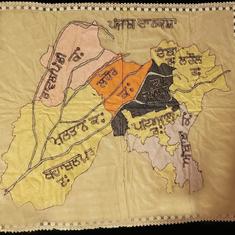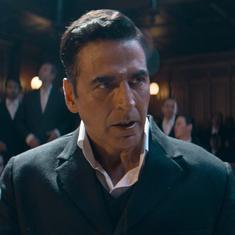This fact, says Dalvi, is what worked against her when all hell broke loose at Awadhnama six months ago.
On January 17 – ten days after Islamist gunmen killed 12 people in an attack on French satirical magazine Charlie Hebdo – Awadhnama on its cover used an old cover image of Charlie Hebdo. which also carried a caricature ostensibly representing the Prophet Mohammed.
The image of the Charlie Hebdo cover was accompanied by a report on how the magazine’s new post-attack edition had sold more than 7 million copies. But the photo of the cover was enough to spark a furore in Mumbai’s Muslim world over the next few days.
By January 19, Dalvi had been accused of trying to gain publicity through controversy, Urdu newspapers refused to publish her written apology and Awadhnama was forced to shut down. Twenty people lost their jobs, but Dalvi – a single mother of two – was also forced out of her house for three months to avoid being arrested. There were three criminal cases filed against her in Mumbai and Thane, for hurting the religious sentiments of a community.
While the cases are still pending and Dalvi has been granted interim bail, the former editor is still grappling with the social and economic consequences of the incident – she has been unable to get a job and barely has enough money to run the house and pay her children’s college fees.
Appealing for help
“So far I’ve sold all my jewellery and have had to borrow money from friends and family,” said Dalvi, speaking to Scroll.in while recovering from an unexpected nasal surgery she had to undergo this week. “I have almost Rs 2 lakh of debt to pay back.”
Now, a collective of human rights activists hopes to come to Dalvi’s aid by appealing for funds from concerned donors across the country. In an email request sent out through its networks, the collective, called "Hum Aazaadiyon Ke Haq Mein", has asked for financial support for Dalvi so that she can meet the educational expenses of her son and daughter, who might be forced to drop out if their fees are not paid.
Dalvi’s attempts to look for a job for the past five months have not been successful, says the email appeal. “It seems like Shirin has been boycotted by the Urdu media. She is doing some translations, which regrettably does not pay,” it said.
Journey to the top
Shirin Dalvi, 47, comes from a low-income family in Mumbra, a Muslim-dominated part of rural Thane that has now become a populated suburb in greater Mumbai. “I was the first girl in my village to be sent to Thane city for completing secondary school,” said Dalvi, who gave her Class 12 exams even though her parents wanted her to stop studying after Class 10.
“I funded those two years by working as a hostel supervisor and writing lots of stories and opinion pieces for Urdu newspapers,” she said. “Writing was my passion – something I couldn’t help but do.”
In 1991, soon after Class 12, Dalvi married a newspaper editor who was in love with her writing and her views. After marriage, he helped her complete a course in homoeopathic medicine, but she never applied for a license. “By then my son was born and my husband didn’t want me to work outside.”
But Dalvi could never really put down her pen, and soon began writing for Urdu papers under a pen name. “I also started assisting my husband at Hindustan Urdu Daily, the newspaper he worked for,” she said. In 1997, after her husband had his first heart attack, both were forced to start working free-lance from home. He died in 2010 after suffering from 13 more attacks.
To support her family, Dalvi now joined Sahafat, another daily, as an assistant editor. “When I left the paper in 2014, I was an associate editor and the only woman journalist there,” said Dalvi. Her next job was as the chief editor of the Mumbai edition of Awadhnama, a Lucknow-based publication.
“I faced a lot of hostility from men who didn’t want to take orders from a woman, and some even expressed that to my face,” said Dalvi. “But it was good job and I loved it.”
Then Charlie Hebdo happened in January, and things came crashing down.
‘It was a mistake’
Dalvi has always maintained – from the time she wrote her apology – that publishing the controversial cartoon was an unintentional mistake.
“I wanted to publish the cover page of Charlie Hebdo’s post-attack edition – the cartoon that says ‘All is forgiven’,” said Dalvi. “It was purely by mistake that we ended up publishing the wrong image – a cover page from several years ago.”
When her phone started buzzing with indignant calls the next morning, Dalvi took a while to figure out what the anger was all about. “I sent out an apology immediately, but eventually only the English media wanted to publish it,” said Dalvi. “The Urdu press published a load of unverified allegations made by a former colleague, even though none of it was true.”
According to Dalvi, several papers alleged that she had deliberately carried the controversial cartoons for personal publicity and money, and that she didn’t care what the community felt. “Why would I do that? Who would pay me for something like this?” said Dalvi.
By January 18, there were at least three FIRs against Dalvi and she had received multiple death threats. “I just left my daughter with my mother and left with my son – we were on the roads for days, trying to secure anticipatory bail with the help of a lawyer.”
‘I’d like to start my own newspaper’
It took two months for the cases to be transferred to the Bombay High Court, where Dalvi was granted interim bail. It took another month for Dalvi to return home without fear, by which time her children had already missed weeks of classes in college.
When she tried to get back to the only work she cares deeply about, Dalvi realised that almost all doors were closed on her. “The Urdu papers had manufactured a social boycott – there was a conspiracy against me that almost everyone believed, except my relatives and friends,” she said. “The others who lost their jobs when Awadhnama shut down are also against me, and some of them have got jobs elsewhere now.”
In the past six weeks, Dalvi has worked on a few translation assignments from Hindi and Marathi to Urdu, and she now writes a weekly column on current affairs for Hindustan Urdu Daily. What she earns from it is barely enough to cover her travel costs.
“If there was an opening at Hindustan, I’d love to have Shirin on board,” said Sarfaraz Arzoo, the editor of Hindustan Urdu Daily, who has known Dalvi for 20 years. “When this controversy broke out, I verified the facts and found that is, indeed, a conspiracy against her – she made a mistake and apologised, so the matter should have ended there.”
For now, Dalvi spends her time looking for work and writing her own books – a novel and an autobiography – that she hopes to get published soon. “If I make enough money again, I’d love to start my own newspaper. That’s definitely my dream.”
– Ms Dalvi can be contacted via Hasina Khan of Hum Aazadiyon Ke Haq Mein at this email address: nj_hasina AT yahoo DOT co DOT in










